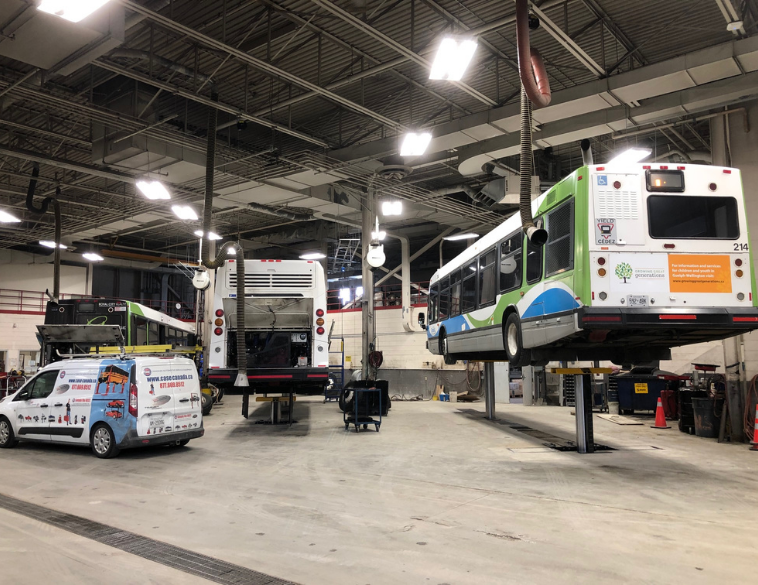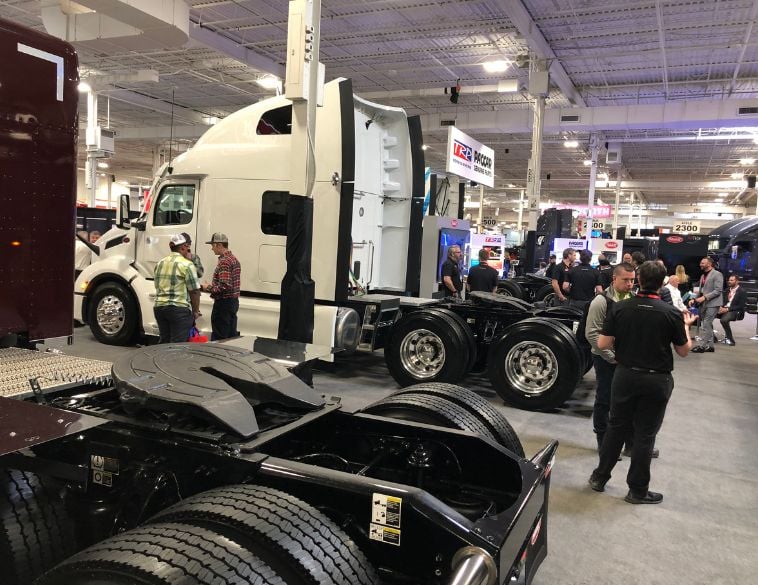With goals set for reducing greenhouse gas emissions from its vehicle fleet, the City of Guelph is focused on long-term sustainability.
Guelph, Ontario has a skyline like few other cities in Canada. Instead of office and condo buildings, the twin towers of an immense church on a downtown hill rise two hundred feet into the air.
It’s an extraordinary sight in a city that is otherwise much like many others.
The City of Guelph’s Fleet Services division, which manages about 1,000 assets for 15 other City divisions, faces many issues that will likely be familiar to other fleet managers.
Guelph is a single-tier city, which means it provides all of its own municipal services: water, wastewater, roads, parks, forestry, solid waste, transit, ambulance, police, fire, traffic, arenas and many other functions. Fleet Services provides transportation and work equipment for all but the police and fire. It operates two garages, one dedicated to Guelph Transit’s fleet of 100 vehicles, and one that serves all the rest.
Fleet Manager Joe Amaral arrived in 2017 and moved swiftly to reorganize the fleet division and recruit supervisors to better manage the business more efficiently.
A whopping fourteen people reported directly to the Fleet Manager, so Joe strategically divided the division by process. One focused on production, centring on the repair shops, another on planning, which provides all other fleet services including vehicle acquisition and disposal, parts and fuel and the final division is dedicated to fleet safety and driver training.
There are now four program managers in place, reporting to the Fleet Manager.
Fleet repair facilities
The daily routine at each garage is different. The Guelph Transit garage is a 24/7 operation, as the bus and mobility fleets start service as early as 5 a.m. and run past midnight. The municipal garage, located near Guelph’s well-known university, operates two shifts, five days per week, with a third shift added when winter weather requires round-the-clock road maintenance.
Both garages are doing more work than designed for. Guelph’s population has been growing steadily and the City’s fleet has expanded to keep up. The municipal garage is 53 years old and was designed for repairing single-axle trucks. These were replaced a long time ago by larger, tandem axle vehicles for waste collection and snow plowing.
Waste collection vehicles are an extreme challenge. Although there are just 21 waste collection trucks, they consume one-quarter of total mechanic hours available in the municipal garage.
Guelph is in the early stages of seeking Council approval for a new Operations facility, including Fleet Services, spurred in part by the City’s plan to use electric-drive buses in the Guelph Transit system. The existing bus garage has a limited electrical supply for battery charging that can’t be remedied at the present location.
A new facility combining all fleet operations in one location is several years away and pending a Council decision. It would be a welcome solution to the overcrowded facilities now endured by fleet staff.
Cost-reduction initiatives
Fleet Services has found opportunities to reduce expenses and improve efficiency. One success was eliminating more than 50 spare vehicles. All of these vehicles have been replaced with new vehicles but the old vehicles were kept in service.
This was called the “Just-In-Case Fleet” and there were many ways to justify it, but overall it required a lot of work to keep tabs on so many extra vehicles and of course, more repairs because of their age and condition.
Fleet Services is also divesting many low-value equipment assets and giving the responsibility for replacing them to their users. Almost half of the assets called “Fleet” have a combined replacement cost of less than 3 percent of the total fleet value of $50 million. Fleet has transferred floor polishers, ice edgers, bicycles, amusement rides and other small equipment articles to the users that operate them.
Most of Guelph’s fleet vehicles have two-way radios for communication in emergencies. Maintaining a radio system is time-consuming so this function has been transferred from Fleet to Corporate Security, which is the appropriate agency for maintaining this system. The camera system on transit buses has also moved from Fleet to Corporate Security.
A computer-based work order management system is a key asset for any fleet. Guelph’s system was originally installed for Fleet and expanded to many other City operations. It is over 20 years old and Guelph is preparing to replace it with a new computerized maintenance management system.
A peculiar feature of the existing system is a complicated numbering convention for fleet assets that confuses Fleet and users alike. A simpler number is being introduced, similar to a 10-digit phone number with an “area code” identifying the class of equipment.
Green fleet plans
Guelph has set goals to reduce greenhouse gas emissions created in City operations such as facility heating, cooling and transportation. About 35 percent of these emissions come from the City’s 80 diesel transit buses, which consume about 2-million litres of fuel each year.
Guelph plans to replace three or four buses next year with electric-drive buses, with funding support from the governments of both Canada and Ontario. The electric bus fleet will eventually grow to 65 vehicles before the end of the decade. Guelph also has a number of electric-powered ice resurfacing machines, electric utility carts and about 20 hybrid cars that will be replaced with battery-electric vehicles over the next several years.
Fleet Services operates six fuel service stations around the city, all but one with modern above-ground storage tanks and automated fuel dispensers.
Communication is key to good customer relations
Fleet Services recently initiated regular customer service meetings using video conference calls because of the pandemic. These are scheduled separately for each user business division every three to four months.
The agenda touches on vehicle replacements, rental needs, maintenance issues and other issues such as this year’s renewal of vehicle licence stickers (delayed due to COVID-19). The users look forward to these meetings and have praised their usefulness.
Also new for the users is access via computer to the virtual whiteboards created by Fleet to track vehicle maintenance progress in both shops including backorders for parts.
Additional whiteboards can be viewed including one that tracks vehicle replacements, one that displays the status of rental vehicle orders and one that tracks vehicle disposals. This has noticeably reduced phone calls and emails asking about the status of work being done by Fleet Services.
What’s next?
The Fleet Services team places a high priority on helping users understand the cost of their fleet assets and the impact their decisions often have on the Fleet budget, which is about $9 million per year.
The focus is now on creating a monthly chargeback to user budgets that fairly reimburses Fleet for all expenses. For the past several years, only fuel has been directly charged to users, with an additional recovery for maintenance based on budgeted numbers, not the actual cost. There is no reserve fund for vehicle replacement and this has been partly to blame for ageing the fleet and driving up repair costs.
The pandemic’s greatest impact on fleet operations is at Guelph Transit, which has been Guelph’s only transportation function to see a significant decrease in use. The City’s recreation facilities have also been subject to closings, followed by short periods of opening and then closing again. The great majority of the City’s fleet has continued in operation with health and safety measures in place.
Guelph’s Fleet Services division has the same issues and procedures as many other municipalities. While it may face many obstacles Fleet Services will ultimately succeed by focusing on great service and good management.
Chris Hill is Program Manager, Fleet Planning at the City of Guelph.



